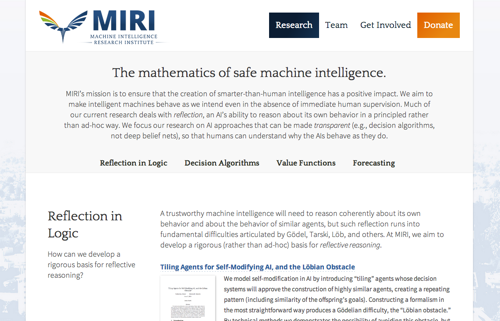
Our new Research page has launched!
Our previous research page was a simple list of articles, but the new page describes the purpose of our research, explains four categories of research to which we contribute, and highlights the papers we think are most important to read.
We’ve also released drafts of two new research articles.
Tiling Agents for Self-Modifying AI, and the Löbian Obstacle (discuss it here), by Yudkowsky and Herreshoff, explains one of the key open problems in MIRI’s research agenda:
We model self-modification in AI by introducing “tiling” agents whose decision systems will approve the construction of highly similar agents, creating a repeating pattern (including similarity of the offspring’s goals). Constructing a formalism in the most straightforward way produces a Gödelian difficulty, the “Löbian obstacle.” By technical methods we demonstrates the possibility of avoiding this obstacle, but the underlying puzzles of rational coherence are thus only partially addressed. We extend the formalism to partially unknown deterministic environments, and show a very crude extension to probabilistic environments and expected utility; but the problem of finding a fundamental decision criterion for self-modifying probabilistic agents remains open.
Robust Cooperation in the Prisoner’s Dilemma: Program Equilibrium via Provability Logic (discuss it here), by LaVictoire et al., explains some progress in program equilibrium made by MIRI research associate Patrick LaVictoire and several others during MIRI’s April 2013 workshop:
Rational agents defect on the one-shot prisoner’s dilemma even though mutual cooperation would yield higher utility for both agents. Moshe Tennenholtz showed that if each program is allowed to pass its playing strategy to all other players, some programs can then cooperate on the one-shot prisoner’s dilemma. Program equilibria is Tennenholtz’s term for Nash equilibria in a context where programs can pass their playing strategies to the other players.
One weakness of this approach so far has been that any two programs which make different choices cannot “recognize” each other for mutual cooperation, even if they are functionally identical. In this paper, provability logic is used to enable a more flexible and secure form of mutual cooperation.
Participants of MIRI’s April workshop also made progress on Christiano’s probabilistic logic (an attack on the Löbian obstacle), but that work is not yet ready to be released.
We’ve also revamped the Get Involved page, which now includes an application form for forthcoming workshops. If you might like to work with MIRI on some of its open research problems sometime in the next 18 months, please apply! Likewise, if you know someone who might enjoy attending such a workshop, please encourage them to apply.